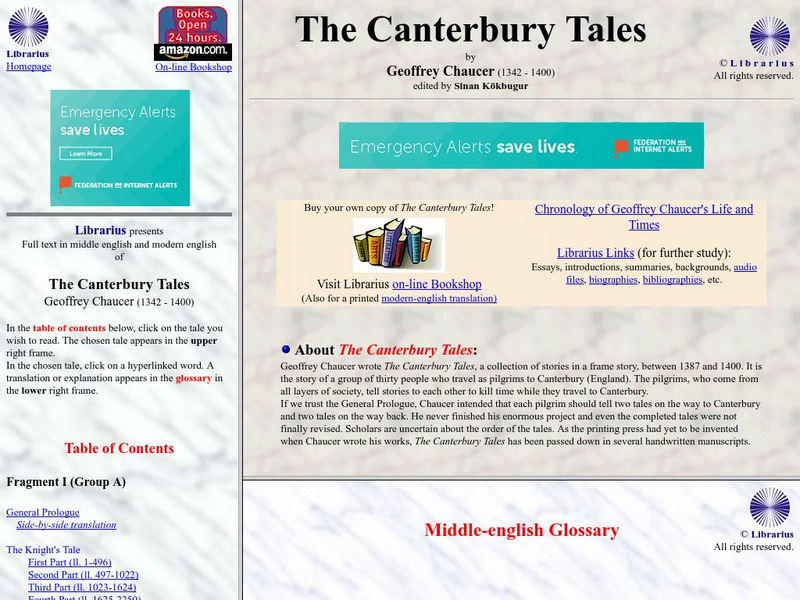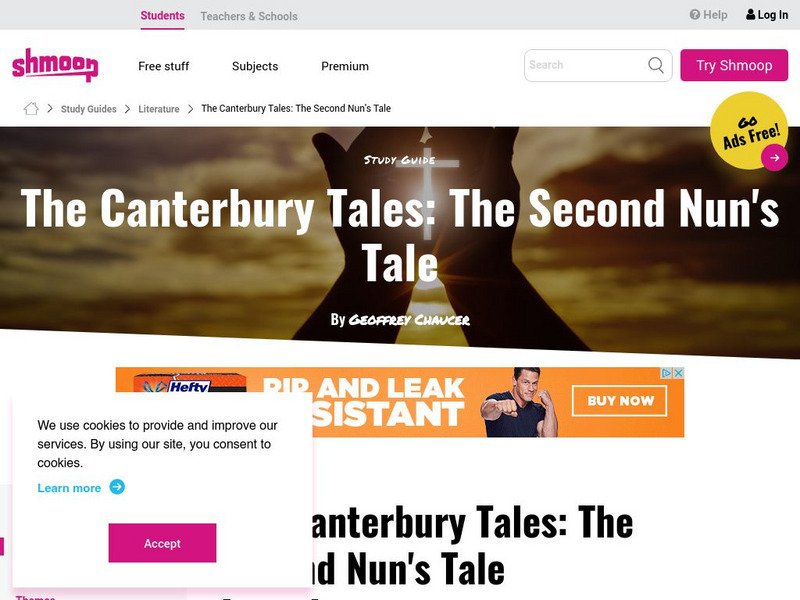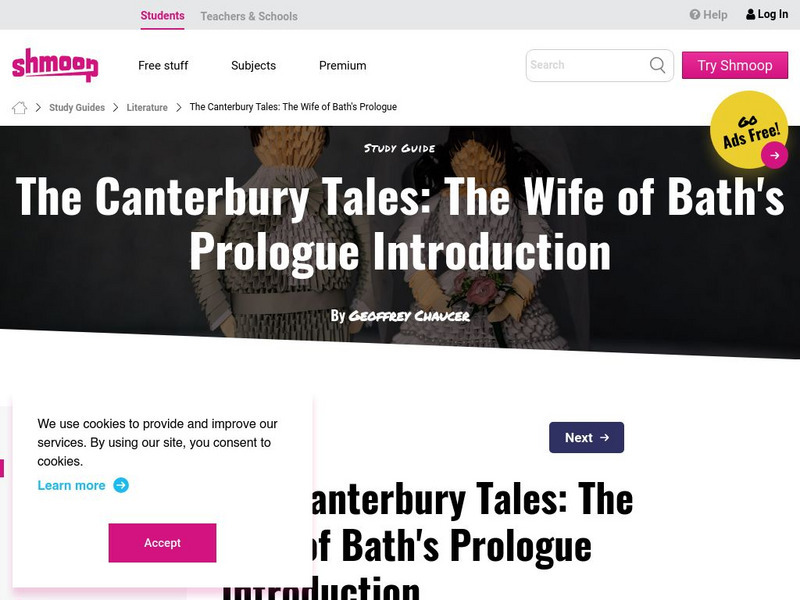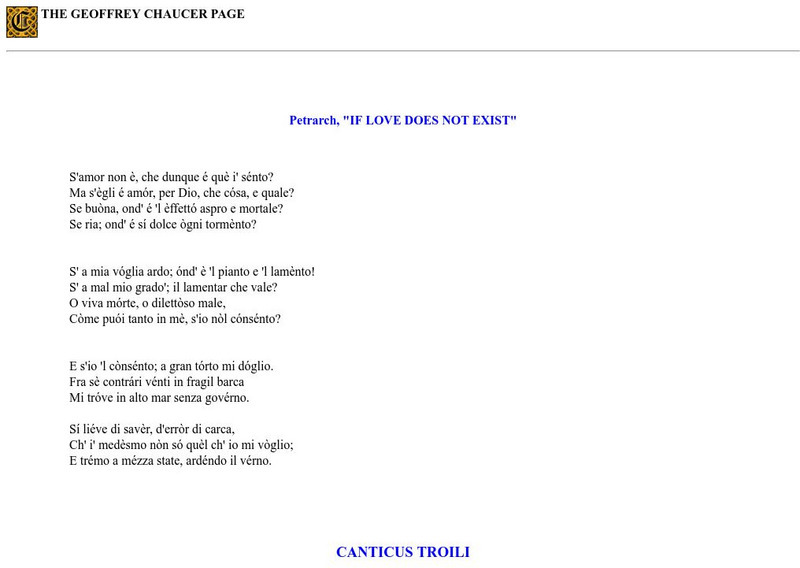Varsity Tutors
Varsity Tutors: Web English Teacher: Joseph Conrad
Explore the life and work of the famous author Joseph Conrad through this informative site.
British Library
British Library: Discovering Literature: Gender and Sexuality
Examine representations of gender, sex, and relationships in medieval literature, from the works of women's writers to tales of courtly love to Chaucer's Canterbury Tales.
British Library
British Library: Discovering Literature: Middle English
This article explains how Middle English developed from Old English, changing its grammar, pronunciation, and spelling, and borrowing words from French and Latin.
British Library
British Library: Discovering Literature: Language and Voice
From the development of Old and Middle English to the innovations of William Caxton and the printing press: explore language and voice in the medieval period.
Harvard University
The Geoffrey Chaucer Page: Lyric Poetry
A brief note about the English lyric poetry prior to Chaucer and how it relates to Chaucer's "tales." Links provided to related topics.
Harvard University
The Geoffrey Chaucer Page: Lease Granted to Chaucer
The text of a 1374 lease document that sheds light on the legal affairs of Geoffrey Chaucer and the real world of The Canterbury Tales.
Harvard University
The Harvard Chaucer Page: The Great Vowel Shift
This site from The Geoffrey Chaucer Page provides examples showing the difference between Chaucer's language and our own. The name of the site is the Great Vowel Shift and the text provided is medium in length, with several examples...
Harvard University
The Harvard Chaucer Page: "Flower and the Leaf"
John Dryden's (1631-1700)translation from the middle English of a poem once attributed to Chaucer. Preface to The Fables (1700)Modern English translation by John Dryden of Chaucer's "The Flower and the Leaf."
University of Florida
University of Florida: Dante, Chaucer, and the Currency of the Word
Website containing links to various medieval poetry and poets including Dante, Chaucer, and other famous works.
Other
Goucher College: "Wife of Bath's Prologue and Tale"
The following from the Goucher College are examined in regard to Chaucer's "The Wife of Bath's Prologue and Tale" from "The Canterbury Tales": Genre, Characters, Summary, and Issues and General Research Sources. Some thought-provoking...
Other
University of St. Thomas: Virtual Medieval Church: Chaucer: Canterbury Tales
Fictionalized Geoffrey Chaucer introduces, you, the reader to The Canterbury Tales.
Bartleby
Bartleby.com: Barltett's Familiar Quotations: Geoffrey Chaucer
A list of famous lines from Chaucer, mainly from "The Canterbury Tales."
Other
Librarius: "The Canterbury Tales" by Geoffrey Chaucer
This site details a chronology of Chaucer's life and the historical events that occurred during that time. It also has the Canterbury Tales with the Middle English and Modern English in a side-by-side format, and provides a Glossary for...
University of Victoria (Canada)
The U Vic Writer's Guide: Literary Term: Heroic Couplet
This site provides a short definition of the term Heroic Couplet along with a short example from a piece of poetry by Pope.
Other
Fl International University: History of English Language
This resource presents a brief history of the English language provided by an amateur historian of English and librarian.
Stephen Byrne
History for Kids: Geoffrey Chaucer
History of the famous 14th Century English poet and bureucrat, Geoffrey Chaucer, who wrote the well known, Canterbury Tales. Includes teacher resources.
Shmoop University
Shmoop: The Canterbury Tales: T He Reeve's Tale
This unsettling tale is looked at in depth in this site that explores, the characters, and themes in one of Chaucer's Canterbury Tales.
Shmoop University
Shmoop: The Canterbury Tales: General Prologue and Frame Story
Read background information on The Canterbury Tales: General Prologue and Frame Story in this informative site that includes a look at the characters.
Shmoop University
S Hmoop: The Canterbury Tales: The Second Nun's Tale
Found in The Canterbury Tales, the Second Nun's Tale is the story of how a woman converts her husband and brother in law to becoming Christians. Read about the other characters in this fascinating tale.
Shmoop University
Shmoop: The Canterbury Tales: The Wife of Bath's Prologue
A most interesting character in The Canterbury Tales, the wife of Bath reveals much about herself and others. This site analysis the themes and other characters in this fascinating story.
Shmoop University
Shmoop: T He Canterbury Tales: The Wife of Bath's Tale
Read and learn more about this fascinating tale in this comprehensive site about The Wife of Bath's Tale.
National Institutes of Health
National Library of Medicine: Medieval Islamic Medicine
A discussion of how Islamic medicine was influenced not only by Greeks and Romans, but also by the restrictions of the Islamic religion.
Harvard University
The Geoffrey Chaucer Page: Chaucer's Ransom
List of "Contributions for Ransoms Made by the King," which includes Chaucer's name and price (following his capture in France).
Harvard University
Harvard's Chaucer Page: Compare Chaucer & Petrarch
Chaucer, in his "Canticus Troili" from Book One of "Troilus and Criseyda," draws from Petrarch's "If Love Does Not Exist." The former is written in Middle English, the latter in Italian, both without glossaries or further translation, so...




















